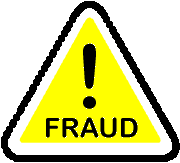Tsunami Scams: How to Avoid the Multiple Tsunami Scams on the Internet
by www.SixWise.com
Millions of people have the best intentions in mind as they donate money
to help the victims of the December
2004 tsunami disaster that claimed hundreds of thousands of lives-American
charities have already collected more than $350 million in contributions.
But along with those good intentions comes a risk. According to Pete
Brust, the acting deputy assistant director of the FBI's Cyber Division,
"Right now we're seeing literally millions a day of fraudulent spam
e-mails going out from various criminal groups." And what do you
think all those e-mails are asking for? Tsunami donations.
|

Internet scams will not contain a warning like this one, so be
sure to use common sense and not respond to unsolicited e-mails.
|
Some of the most common Internet scams to watch out for include:
-
E-mails asking for donations to be deposited directly into accounts
of supposed tsunami victims.
-
Phishing scams
that claim to be reputable tsunami relief organizations.
-
Offers to locate missing persons, for a fee.
-
E-mails that claim to contain photos of the disaster but actually
contain worms and viruses.
-
E-mails reminiscent of the Nigerian fee scam asking recipients to
help wire money out of the country. In this case, spam e-mail is sent
and the recipient is asked to help a "son of Indonesian grocers"
who were killed in the disaster to retrieve large amounts of money
from a bank account in the Netherlands.
Natural disasters present a prime opportunity for scam artists looking
to play on people's goodwill. Daniel Borochoff, president of the American
Institute of Philanthropy, a nonprofit charity watchdog group, says, "These
kinds of tragedies are easy pickings for scammers. People are anxious
to help out, and the scammers come out of the woodwork to take advantage
of that."
This doesn't mean that you can't make a contribution safely. The following
tips, compiled from Consumer Reports WebWatch, Scambusters and the FBI,
will help you to avoid getting scammed while trying to help victims of
the tsunami disaster:
-
Don't respond to unsolicited e-mail regarding the tsunami, even if
it seems like a reputable source.
-
Never respond to an e-mail request for a donation or personal information.
-
Be wary of e-mails from people claiming to be survivors or foreign
government officials asking for help in moving large sums of money
to overseas bank accounts.
-
Confirm the legitimacy of nonprofit organizations by researching
them online. Then go directly to the charity's Web site to make donations
(rather than through a link from another site).
-
Only open e-mail attachments from people you know. Others may contain
viruses.
-
Use a credit card instead of a debit card to make payments online
(they offer the greatest protections against fraud).
-
Contact the organization directly by phone if you doubt its authenticity.
-
If you think you've received a fraudulent e-mail, forward it to the
Federal Trade Commission at spam@uce.gov.
Also, be on the lookout for non-Internet tsunami scams. Reports have
come in of scam artists going door-to-door and even setting up booths
in malls to gather donations for fake tsunami charities.
Sources
Beware
of Tsunami Scams
Groups Warn
of Tsunami Scams
Tsunami
Scams Beset Internet
Tsunami Scams
Abound
Tsunami
Scams